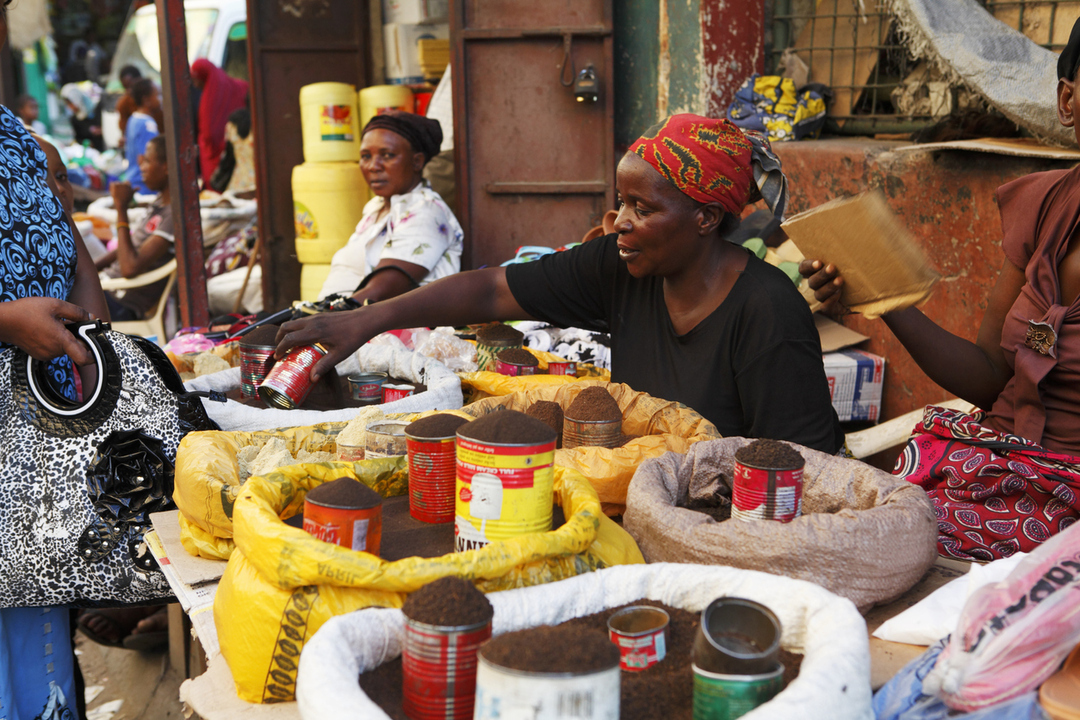Informal workers get creative on addressing shortfalls in social security – Greater state support still needed

More than 80 percent of the population of sub-Saharan Africa is employed informally, working in poor conditions, with few benefits such as maternity leave, and limited options of organizing in trade unions. And in most countries the level of social security provided by the state is lower than in Asia or Latin America.
A study being conducted by the Friedrich Ebert Stiftung (FES) has found that community-based groups often step up to ensure some level of social security among informal workers, who in turn are willing to participate financially on an ongoing basis. Religious communities and savings clubs were found to support their members in times of need.
In the case of savings clubs, these were found to be multi-functional, serving as funding vehicles to cover social risks. In this sense that can be seen to be making up for the absence of state-run social protection schemes. Participants’ willingness to pay for membership in these schemes could be useful information for designing state policies.
The FES survey has to date covered Benin, Kenya, Senegal and Zambia. It is part of a wider project that is due to cover Ethiopia and Ivory Coast before the end of 2020. Questionnaires on views, attitudes, and expectations are filled out in face-to-face interviews with a nationally representative sample of 1,200 households in each country. To assure cross-border comparability of findings the data collection is implemented following the same procedure in each country.
The study aims to fill information gaps on how informal workers see their situation: Are they prepared to move into formal social protection schemes if circumstances permit? What sort of assistance do they expect to receive from government to improve their economic and social circumstances?
According to the survey informal workers said that, regarding improvements in state services, the provision of health services was a top priority. In the countries surveyed so far, between 70 and 95 percent of informal workers have no health insurance. A minority of those benefit from some free health services, but most pay their own health bills, often depending on traditional solidarity bonds when a family or community member is able and willing to help or facing debt as a result.
To minimize the impact of health shocks, many informal workers are prepared to pay to join health insurance schemes. Where there are no formal options, the community-based mechanisms such as churches and savings clubs step in.
The results of the study, once completed, may be transferred to an advisory service for political decision-makers and the adjustment of FES projects. Furthermore, the current Covid-19 pandemic will leave no health system on earth untouched. Insights into health coverage for informal economy workers may also guide the establishment of broad and effective health coverage systems in sub-Saharan Africa.
Informal employment here is taken to mean not only those employed by informal enterprises, but also those in formally registered business units that are not covered by formal social insurance schemes. Informal workers are grouped into four types: informal employers, informal employees, informal own-account workers and family support workers.
The research interest can be grouped into three large topical sections: health services, trust in the state and self-organization. Having identified that health services are of critical importance, the next essential step will be to explore informal workers’ expectations and financing: What are informal employment workers experiences with health services? Do they have health insurance? How do they finance medical treatment?
This study also raises the wider question of how far informal employment workers trust the state and its government in general: What kind of services do informal workers expect from the state? Would they be willing to pay taxes and fees for these services? How do they see the state’s capacity and willingness to provide these services? These essential questions will also be explored by further data gathering and analysis at later stages of the study.
Finally, the various forms of self-organization identified by the survey need further examination. A better understanding of these groups can help design the best way to support existing efforts by informal economy workers to fight for their rights and proper working conditions.
The results so far clearly demonstrate that informal employment workers do not accept their exclusion from formal social protection schemes as a given fact. They engage in alternative and informal forms of solidarity building. And even then, they are prepared to enter formal schemes and expect government to invest in better health services. Now it is up to governments and their policy approaches to reach out and build on this.
Abouth the authors
Dr. Rudolf Traub-Merz has held various positions at FES. Amongst others he was the country director of the FES offices in Benin, Russia, Philippines, Zimbabwe and Cameroon. He currently coordinates the survey project “Informal employment, social protection and political trust in sub-Saharan Africa.”
Anne Felmet is a desk officer with the Africa division at FES. She is responsible for the coordination of the special initiative for a world without hunger (Sonderinitiative eine Welt ohne Hunger) under which the survey project is implemented.
About FES Connect
Connecting people, in the spirit of social democracy, we source and share content in English from the German and international network of the Friedrich-Ebert-Stiftung.




